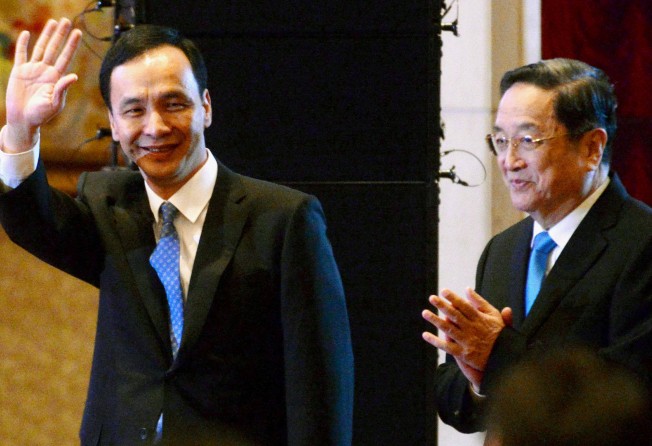KMT chief Eric Chu hopes for bigger global role for Taiwan
Cross-strait consensus could help island play part in regional projects like AIIB, Eric Chu says

The head of Taiwan's ruling party expressed hope yesterday that the island could play a bigger role in the global community based on a crucial cross-strait consensus.
The appeal by Kuomintang chairman Eric Chu Li-luan was expected to get a positive response from Communist Party general secretary Xi Jinping during their talks in Beijing today, analysts said. Chu, who is leading a 100-member delegation, was due to leave Shanghai for Beijing yesterday and meet Xi at noon today before returning to Taiwan at 8.30pm.
Chu said Taiwan should be able to play a vital role in regional economic efforts like the Beijing-proposed Asian Infrastructure Investment Bank and the "One Belt, One Road" economic initiative, as well as the Regional Comprehensive Economic Partnership. "Taiwan should be able to perform well in terms of business innovation and research, despite its smaller economic scale compared with the mainland," Taiwan's Central News Agency quoted him as saying.
Chu made the comments during the opening ceremony of the 10th KMT-Communist Party forum, held annually since 2006 - a year after a historic fence-mending meeting between then-KMT chairman Lien Chan and then-Communist Party leader Hu Jintao in Beijing.
Yu Zhengsheng , chairman of the Chinese People's Political Consultative Conference, said participants in the forum could discuss ways for Taiwan to join the AIIB, the "One Belt, One Road" initiative and the regional free-trade agreement.
"Such discussions are aimed at jointly increasing the competitiveness of ethnic Chinese and expanding their presence in the international market," CNA quoted Yu as saying.
But he stressed that all proposals should be in the context of the "1992 consensus", in which both sides agree there is only one China but each has its own interpretation of what "one China" is.
Ties have improved sharply since the KMT's Ma Ying-jeou became president in 2008 and agreed to recognise the consensus as the main basis for peaceful development of relations between the two sides.
Analysts said Chu was expected to express the same sentiment during his meeting with Xi.
"In discussing cross-strait economic exchanges, the two are expected to touch on Taiwan's bid to join the AIIB and how the two sides can jointly take part in regional economic integration," said Ni Yongjie, deputy director of the Shanghai Institute of Taiwan Studies.
Ni said Xi was expected to " give bigger concern and [ensure] more benefits to Taiwan" in these areas.
During the opening of the forum, Chu said it was important that the benefits of cross-strait ties flowed to all of the island's residents, and that the younger generation be given greater room to contribute.
Chang Wu-ueh, head of the Institute of Chinese Mainland Studies at Tamkang University in Taipei, said Chu was expected to discuss with Xi "ways to enable the general public or the grass-roots people in Taiwan to share the benefits of cross-strait cooperation" in order to head off criticism by the pro-independence camp in Taiwan.
The opposition, led by the Democratic Progressive Party, says cooperation only benefits big businesses in Taiwan.
DPP chairwoman Dr Tsai Ing-wen said yesterday the KMT should never have thought it represented the interests of the island, given that KMT-Communist Party ties were not cross-strait relations. She asked Chu to bear in mind Taiwan's "national interests" during his talks with Xi.